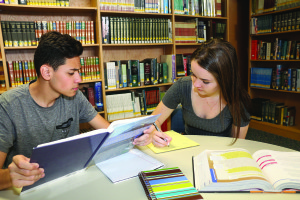By Shelby Stewart
Staff Writer
Brandon Twp.-Eating mac and cheese and running cross country are two things that exchange students from Brazil are loving in America. 
Brandon students Mateus Wanderley, 16, and Pietra Magnagnagno, 15, arrived in the United States last summer for a school year long stint as a Blackhawk.
“The culture is totally different,” said Magnagnagno. “Like people when they meet each other, they don’t give a kiss on the cheek. I tried to kiss someone on the cheek and they were like ‘oh my God.’ It was weird.”
Wanderley is from northern Brazil, and Magnagnagno is from the southern regions of largest South American country with a populaton of about 200 million.
“My state’s more cold than his,” said Magnagnagno.
“Mine is better,” quiped Wanderley .
“No it’s not,” Magnagnagno said. “I love my state.
Though they didn’t know each other before coming to America, the two are best friends now here in the United States.
“We became friends because when you have a way to make things easier for you, you use it, and for us, it’s like, I speak Portuguese, he speaks Portuguese, it’s going to be more easy,” she said.
“We have the same culture. The people here are so weird to us, like they don’t give hugs, like when you’re dating, you walk and grab hands, that’s weird for us,” he added. “And they don’t eat real lunch. In Brazil, we don’t have a big breakfast, and they eat like, real food.
And here, everybody cleans the house, in Brazil, we hire people to do that for us.”
“Okay, that’s not all people in Brazil, that’s just him,” she said.
One of the most challenging things that the pair has encountered in America is language, though they have both been studying English for years.
“You learn the formal English, and here people use slang,” she said. “It’s difficult.”
“Like WDYM, that’s what do you mean,” said Wanderley.
“Now I know,” said Magnagnagno. “Or hit me up, it’s like what? HMU, what does that mean? It’s really funny because we have to ask.”
Both of them also face the same confusion over their own language and culture.
“Everybody thinks we speak Spanish,” she explained.
“Or that we speak Spanish or we speak Brazilian,” he said.
“Brazilian doesn’t exist,” she added.
Another challenge they have both faced is travel, since neither can get a driver’s license.
“I miss my liberty,” said Wanderley
“We live in big cities, now we’re in a small city with grass everywhere,” Magnagnagno explained.
“We have Uber, and I can go wherever with my friends,” he said. “Here we need to ask for a ride from our parents.”
“In Brazil, we drive at 18, and it’s really nice here because people who are 16 can drive,” she added.
Both of them have larger host families with multiple siblings, though Wanderley is an only child in his family.
“Here my host family has three kids, a boy my age, a girl who is 12 I think, and a little guy who is 8, and they have another exchange student too. It’s a very busy house with four dogs, but I love it,” said Wanderley. “In Brazil, I don’t have siblings. In Brazil, I pass my time alone, and it’s strange here because I pass my time alone. I love to be alone.”
“No he doesn’t, he calls me every time,” said Magnagnagno.
“No I don’t, I like to be alone,” he insisted.
After school, Magnagnagno plans on going to collage in America. Wanderley is uncertain if he will go to college, but he wants to go into the business world and live part time in Brazil and part time in America.
“I’m thinking about psychology,” said Magnagnagno
“She can’t do psychology, she’s crazy,” added Wanderley.
“Thank you, sweetie,” she said. “I’m thinking about being a doctor.”
Wanderley is looking forward to going to the beach with his friends when he returns, but Magnagnagno said she would miss the food in America.
“Some foods are really, really weird, it’s bad, but ma c and cheese is awesome,” she said. “We don’t have mac and cheese in Brazil.”
